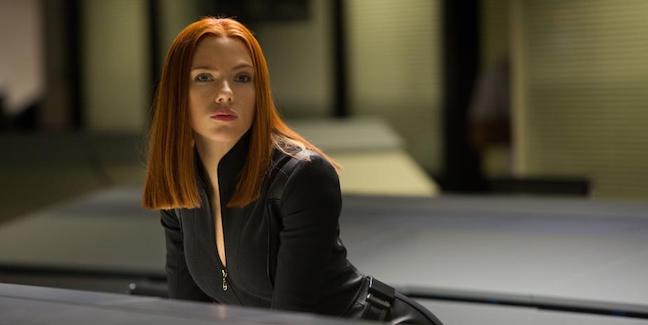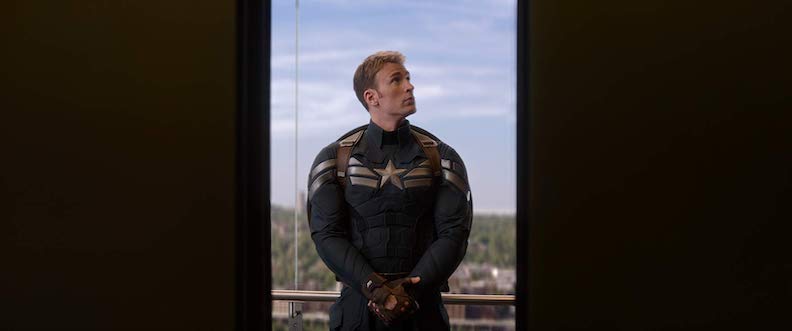“You gave me this mission. This is how it ends. S.H.I.E.L.D.’s been compromised. You said so yourself. HYDRA grew right under your nose and nobody noticed.”
The secret defense organization is compromised, and Captain America gets caught up as a target for Hydra and their main assassin, a man Cap knows all too well.
Captain America: The Winter Soldier (2014)
Directed by Anthony Russo and Joe Russo
Screenplay by Christopher Markus & Stephen McFeeley
I can’t believe this movie only came out 5 years ago. Since its release in 2014, Marvel Studios has put out 11 movies, with three more scheduled in the next six months. THE WINTER SOLDIER was really the lynchpin of the second phase of Marvel Cinematic Universe films, and together with AVENGERS: AGE OF ULTRON really set the stage for the story over the last five years.
Of all the solo Marvel hero films, the CAPTAIN AMERICA movies have always been more intrinsically tied to the AVENGERS series than anything else, so it makes sense that the tenor of the movies are set from the CAPTAIN AMERICA films.
The idea of Hydra not only infiltrating the upper echelon of the Strategic Homeland Intervention, Enforcement & Logistics Division but also high levels of the United States government leads to a level of distrust throughout the Marvel Universe. And that distrust was exacerbated by the actions of the Avengers in AGE OF ULTRON. And that, of course, leads to the events of CAPTAIN AMERICA: CIVIL WAR. All the dissension starts here, as Steve Rogers is being hunted by Hydra as they tear down S.H.I.E.L.D. from the inside.
As if a coup from a Nazi-based terrorist threat wasn’t enough to cause Captain America headaches, they sent his former best friend Bucky Barnes – now a trained assassin with a cybernetic arm – to kill him and his allies. And Steve Rogers is still adjusting to waking up 70 years in the future and has Black Widow trying to set him up on dates. When someone who looks like Scarlett Johansson is teasing you about your dating game, it’s going to give you a negative attitude. Or at least a frustrated one.
The rapport between Chris Evans and Johansson is played for levity, and it’s an appreciated distraction from the high stakes of the rest of the movie. Throw in Anthony Mackie’s Sam Wilson, and the film’s three main heroes have such a great rapport. Watching them interact and how well they got along really added to the film’s stakes when things get as dire as they could get.

But the biggest head-scratcher of the film is watching how well Johansson handles her role – she’s basically the co-lead of the film with Evans, considering her screen time and importance to the plot – and realize that no one at Marvel Studios was able to get a solo Black Widow film off the ground. I know a lot of people are hyped for CAPTAIN MARVEL next month, and how it’s the first Marvel Cinematic Universe film with a female lead. But it really should have been Black Widow.
There’s such great potential for back story and new plot with Natasha Romanoff, instead of just the bits and pieces we get in other films. And they have one of the most popular actresses in the world attached to the part! How have they not been able to get their ducks in a row to produce a Black Widow film? It’s absolutely baffling.
But that has nothing to do with my enjoyment of this film. It’s just a frustrating “what could have been.”
After CAPTAIN AMERICA: THE FIRST AVENGER, which was a war movie that just happened to feature a superhero, the sequel takes a different tact. The Russo brothers give us an intricate political thriller with some nice twists and turns as Cap, Black Widow and Falcon discover the lengths of the conspiracy they face. Even at more than 2 hours, the film never stops engaging the audience. It’s probably my favorite of the Marvel films.
